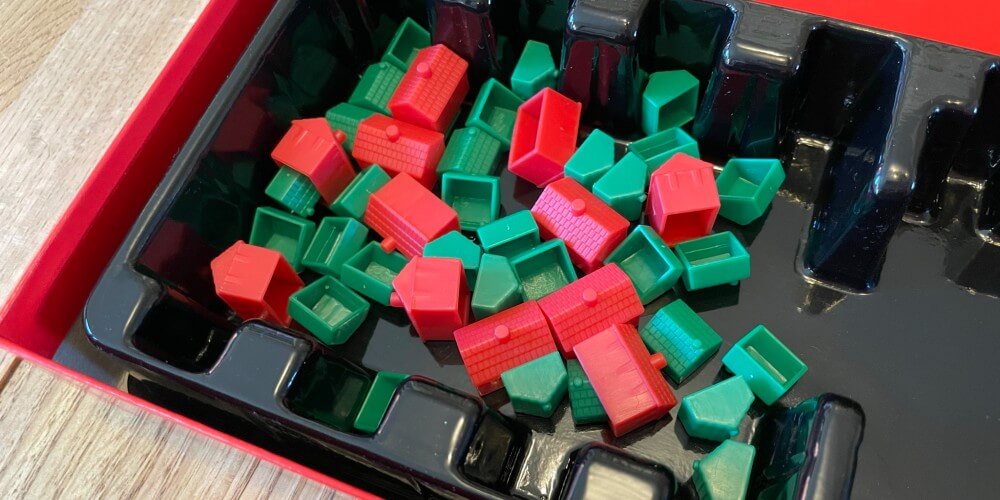

Buying houses is one of the most important things you can do in Monopoly.
But, there are a lot of rules around buying houses, and it can be a little complicated.

Don’t worry though, this guide will answer some of the most common questions about house-buying rules, and make sure you know exactly how to buy houses and the best time to do it.
Need a little help with selling houses? Read that guide here.
Here’s a quick summary of the house-buying rules:
When you own all of the properties in a Monopoly color group, you can buy houses. You have to build equally – this means you can’t build a second house on a property unless you have a house on all the other properties.
The cost of buying a house varies, but to buy a house you just need to pay the value (determined by the color group) to the bank. You can buy as many as you want in one turn, as long as you spread them evenly on a color group.
The only time this differs is when you reach the last house in the game. There aren’t enough houses to place four on every property, so if only one is left in the bank, it must be auctioned between the players, using the normal auctioning rules.
You can begin to build houses as soon as you own all of the properties in a color set. They cannot be mortgaged – if any are, you’ll need to unmortgage them before buying a house. Then, you can buy houses during your turn, or in between other players’ turns.
There’s a great strategy you can use when planning when to buy houses. If you have a cluster of opponents around six to nine spaces from your color set, you should aim to spend as much as you can reasonably afford to upgrade.
That’s because there’s a high likelihood that one of the players will roll to land on one of those properties. So, even if it’s not your turn, you can load up your properties with houses ready to maximize the rent you’ll collect when they roll!
Just be careful – while you can use this tactic when it isn’t your turn, don’t leave yourself short of cash for your own turn, especially if you’re approaching high-value properties owned by your opponents.
You can only sell houses for half their value, so if you buy them but then need to sell them to raise cash to pay rent, you’re losing money.
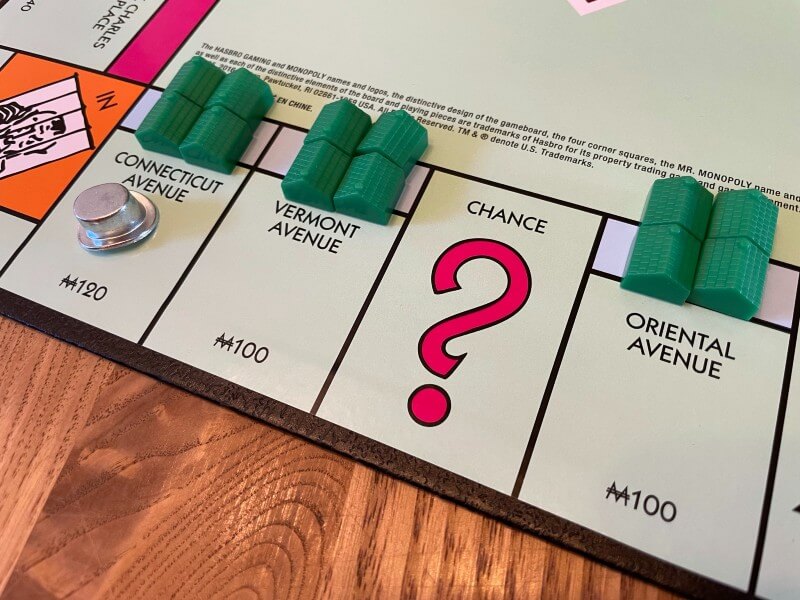
You can buy houses on your turn, or in between other players’ turns. You can’t just announce that you’re buying houses whenever you feel like it – you need to wait until a player finishes their roll and takes any action for the space they land on.
If the next player rolls before you ask to buy a house, you’re too late and you’ll have to wait until the end of their turn – so make sure you’re paying attention!
If you want to buy houses during your own turn, there are some actions you need to take first. You must first roll the dice, move your token, and carry out any action on the space you landed on. Only then can you buy houses.
So, you might need to buy or auction property, pay rent, draw a card, or go to jail before you buy houses. It actually makes more sense to do it this way. It would be bad if you spent your money on houses just before you rolled and discovered that you needed the cash for something else.
In Monopoly, you don’t have to land on your property to buy houses. You can buy them regardless of where your token is on the board, provided you own all the properties in the color set that you’re buying them for.
That’s what makes house buying so tactical – you can wait until you know you have the funds and players are likely to land on one of your properties before you upgrade. You don’t need to have your token in the perfect place.
You must own all the properties in a color set to start placing houses on those properties, and none of them can be mortgaged. If you have mortgaged properties as part of a set, you need to unmortgage them before buying houses.
This is where trading becomes so important. The likelihood of landing on all of the properties in a set before someone else does is minimal. And even if the other players put the properties to auction, they will likely outbid you to prevent you from getting a full set.
But, by trading cleverly, you can secure a monopoly on a color set and leave yourself free to start building.
In Monopoly, each house cost between $50 and $200, depending on the color set:
The easy way to remember how much houses cost in Monopoly is to know that on the first side of the board they cost $50 each, then they go up in increments of $50.
The price of houses plays a big part in judging which Monopoly spaces are the best. While the more valuable properties will earn you the biggest rent, they also cost the most to upgrade.
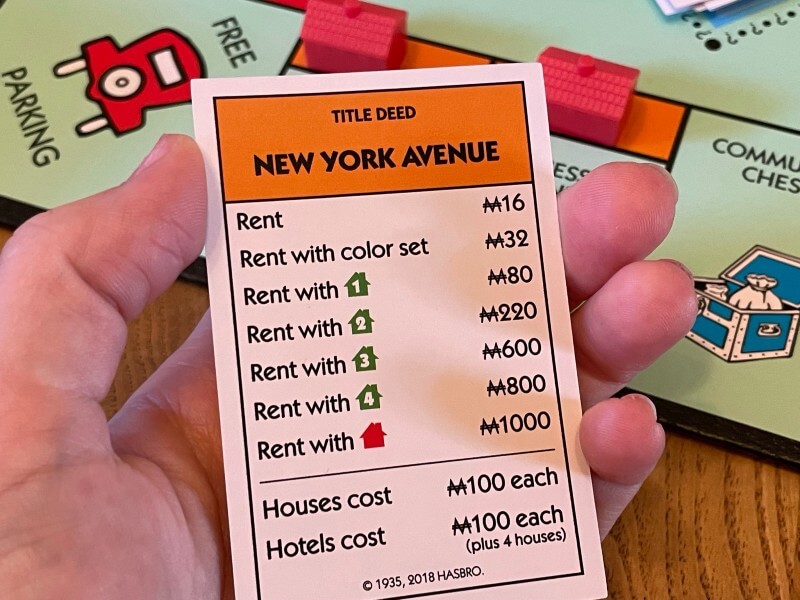
Placing four houses on all three Green properties would cost you $2400 in houses alone, and $3320 when you include the cost of buying the properties.
To upgrade the Oranges with four houses on each, that’s a total house cost of $1200, or $1760 including the properties.
And yet, the rent for four houses on the Orange New York Avenue earns you $800, while on the Green Pennsylvania Avenue it’s $1200.
Is it really worth that extra $1560 to upgrade the Greens, just to get an extra $400 in rent? I would say no.
You can buy as many houses at a time as you can afford in Monopoly, as long as you spread them evenly. Remember that you don’t need to land on the property that you’re building on.
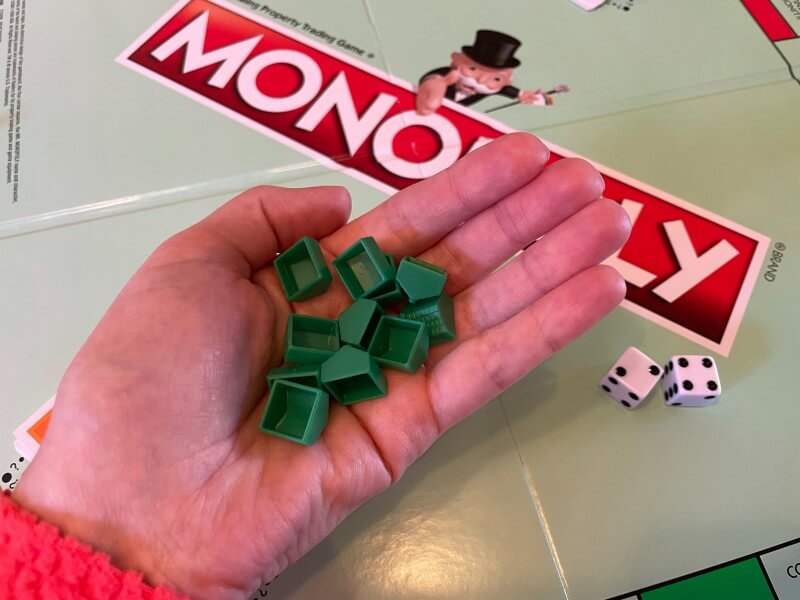
You have to spread houses evenly on a single color set, but you don’t have to spread them evenly across different color sets. So, if you owned all the Reds and Yellows, you could have four houses on the Reds and only one on the Yellows.
What you can’t do is own all the Reds and then place four houses on Illinois Avenue but only two each on Kentucky Avenue and Indiana Avenue.
If you want to buy eight houses, you’d need to place three on one property, three on another, and two on the last property. You then couldn’t add a fourth until you’d added the third house to the one with two.
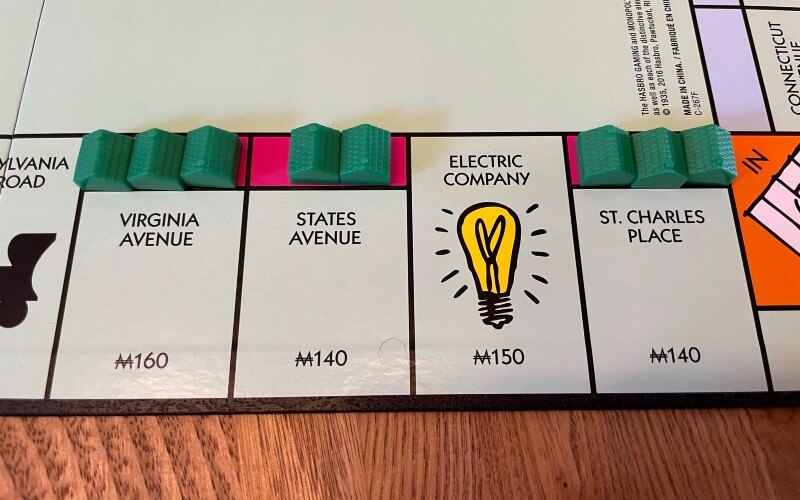
In Monopoly, you can still buy and sell houses, hotels, and properties while you are in jail. The only punishment for being in jail is that you can’t move around the board and collect your $200 for passing Go.
Later in the game, when your opponents have a lot of high-value property, jail can be a good place to be to avoid paying rent, especially if your opponents have stacked the Greens and Dark Blues with houses and hotels.
Suddenly that ‘Go to Jail’ space becomes something to aim for.
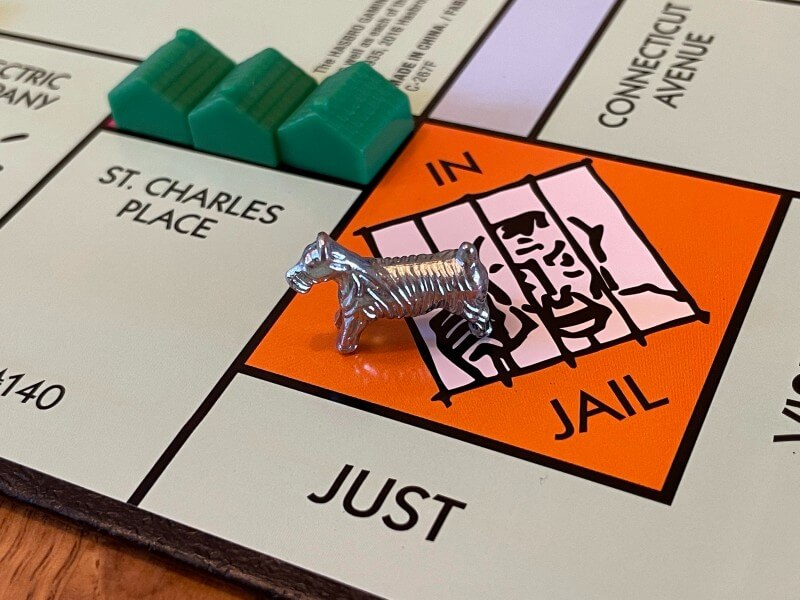
Hotels are the pinnacle of upgrading a property in Monopoly. They earn you the most rent and can be seriously damaging to the cash reserves of your opponents. Even New York Avenue, the last of the Orange spaces, has a four-figure rent with a hotel.
You can buy a hotel on any property that has four houses. You don’t need to upgrade a whole color set to hotels at once – as long as all properties have four houses, you can buy one hotel at a time.
The process for buying hotels is very similar to buying houses. You can do it at the end of your turn or in between other players’ turns.
In order to build a hotel, you first need four houses on the property. There may be some versions of Monopoly where this is different, but in the standard rules, you always need those four houses on all of the properties in the set.
One example where it is different is in Monopoly: Longest Game Ever. In this game, there are three of each property on the board and you only need four houses total across those properties. So, if you have two houses on Boardwalk, one on Boardwalk 2 and one on Boardwalk 3, you can upgrade to a hotel.

You can only have one hotel on each property. There are only 12 hotels in the box and once these are gone you cannot build any more hotels until another player sells one back to the bank.
In Monopoly, a hotel costs the same as a house. So a hotel on the first side of the board is $50, then $100 for the Pinks and Oranges, $150 for Reds and Yellows, and $200 for Greens and Dark Blues.
Therefore, it’s technically possible to buy hotels on your second turn, but only on the Light Blues. You’d need three players, and all of you would have to land on a different Light Blue, with you winning the two you didn’t land on in an auction.
Assuming you bought the properties at their value, that’d cost $320. 12 houses would then cost $600, and three hotels another $150, for a total of $1070.
Of course, you’d then be risking traveling around the board with just $430 until you landed on Go.
However, in the perfect scenario, if an opponent had landed on Connecticut Avenue, auctioned it, and you won it and upgraded, and then that player rolled a 3 on their second turn, they would have to pay you $600 in rent on just their second turn. Ouch!
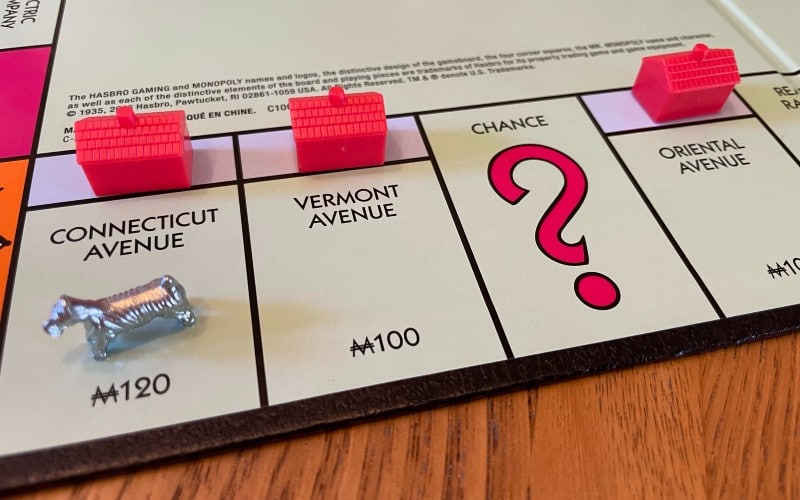
If you want to buy a house in Monopoly, you need to own all the properties in that color set. You then just inform the banker that you want to buy houses – tell them how many, and pay the required amount. The banker will give you the houses to place on the properties.
When can you buy houses in Monopoly?In Monopoly, you can buy houses during your own turn, or between other players’ turns. You can’t do it at any time, you do need to wait until a player has finished their turn. Otherwise, you could get an unfair advantage and build just as a player has rolled to land on your property.
How much is a house in Monopoly?Houses (and hotels) in Monopoly cost $50, $100, $150, or $200 depending on which side of the board the properties are on. The cheapest houses are on the brown and light blue properties, and the most expensive are on the green and dark blue properties.
Do you have to land on your property to buy a house in Monopoly?You do not have to land on your property in order to build a house or hotel on it. You can build on your properties from any space on the board, even if you are in Jail.
When you understand all of the Monopoly rules around buying houses, it’s not as complicated as it may first seem. As long as you own all of the properties in a set, and you build houses evenly, then you can pretty much buy them almost at any time.
Just be careful not to overstretch yourself with houses. If you end up leaving yourself short of cash, and you roll badly, you could have to sell them off for a much lower value.
And remember that you can’t trade houses. You can learn the best trading strategies with my guide.
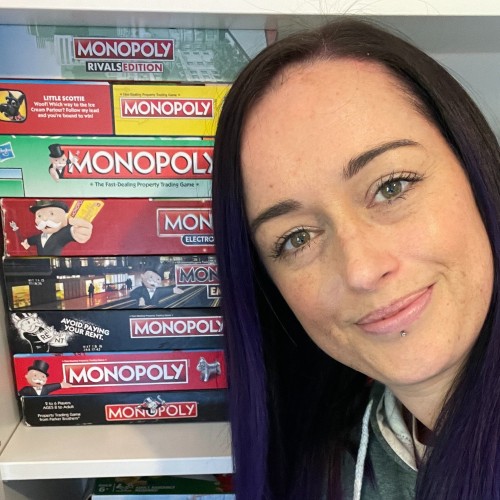
Jenni Fielding is the founder of Monopoly Land - an unofficial fan site. She has been a huge fan of Monopoly and has been playing the game for over 30 years. She is a stickler for the rules and loves to find vintage Monopoly sets in second-hand shops.